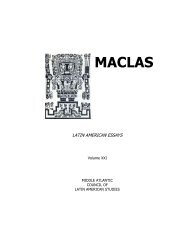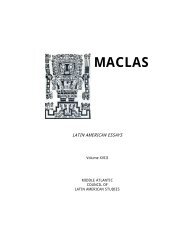latin american essays maclas
latin american essays maclas
latin american essays maclas
Create successful ePaper yourself
Turn your PDF publications into a flip-book with our unique Google optimized e-Paper software.
The 2000 municipal elections, separated for the first time from national<br />
elections, gave the Sandinistas control of most major municipalities, including<br />
Managua. This result put the FSLN in a strong position going into the national<br />
polls in 2001. The PLC nominated Alemán’s Vice President, the prominent<br />
businessman Enrique Bolaños, while the FSLN again nominated Daniel Ortega.<br />
Bolaños won an easy victory with 56 percent of the vote to Ortega’s 42 percent,<br />
although Ortega received a higher voting percentage than in the preceding<br />
elections of 1990 and 1996, and increased his total votes by 37.6 percent.<br />
Bolaños also had the highest percentage ever received by an anti-Sandinista<br />
candidate, and increased his vote count over Alemán’s by 35.8 percent. The<br />
party system was polarizing: besides the PLC and FSLN, only the Conservatives<br />
received any representation in the Assembly (Nohlen 2005, 498).<br />
Although presidential systems tend toward bipolarity because of the<br />
inherent winner-take-all character of presidential elections, this tendency was<br />
emphatically reinforced not only by the Ortega-Alemán pact, but also by the<br />
direct intervention of the United States in Nicaraguan politics. It has been a<br />
constant of U.S. policy since the Reagan years to oppose Sandinista control of<br />
the Nicaraguan government, and to do so when necessary in a highly public<br />
manner. Public intimidation of the Nicaraguan electorate by U.S. ambassadors<br />
and senior State Department officials is such a normal occurrence that it no<br />
longer produces public expressions of outrage. The U.S. embassy has<br />
consistently pressured the anti-Sandinista forces to cooperate and to support a<br />
single candidate, and has made it absolutely clear that a Sandinista victory would<br />
lead to severe economic consequences.<br />
A new element of U.S. policy under the current George W. Bush<br />
Administration (200l-2009) has been the rejection of Alemán because of his<br />
egregious corruption. The Embassy encouraged the newly elected Bolaños to<br />
prosecute Alemán, an initiative that ultimately succeeded (with Sandinista help)<br />
in removing his immunity from prosecution (as an ex officio deputy), followed by<br />
conviction and house arrest. It appears that the Bush Administration was<br />
embarrassed by its association with Alemán, and sought to have Bolaños take<br />
over the PLC. But Alemán proved to have a much firmer grasp on his party than<br />
either the Embassy or Bolaños expected. Thus most of Bolaños’ term was taken<br />
up by a constitutional crisis between the President (with a small number of<br />
supporters in the Assembly) and an informal coalition between Alemán’s PLC and<br />
Ortega’s FSLN. Only toward the end of 2005 did the Sandinistas shift to provide<br />
some support for Bolaños.<br />
Approaching the elections of November 2006, the Bush Administration<br />
thus found itself in the awkward position of having backed the main loser in the<br />
current political struggle. It still wanted to block a Sandinista victory, but it also<br />
needed to block the PLC, which was still controlled by Alemán. The former<br />
strategy of blocking the Sandinistas by promoting unity among the anti-<br />
21




